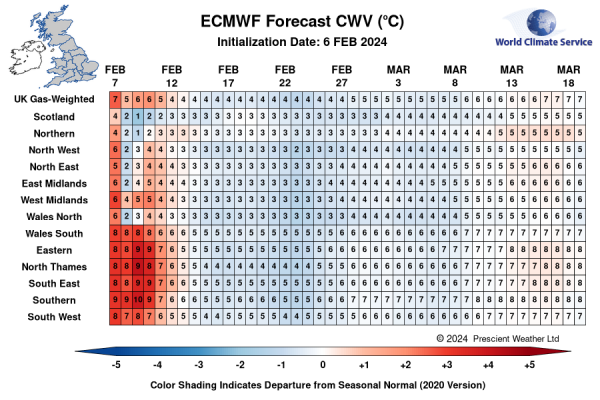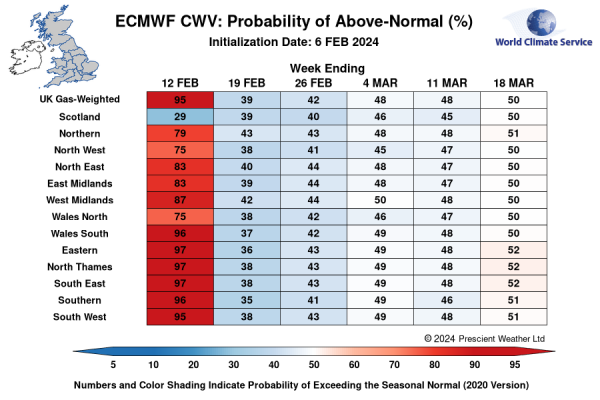Leveraging CWV Forecasts for Competitive Advantage
The CWV Customer: Jellyfish Energy
Jellyfish Energy, the trading name of Switch Business Gas and Power Limited, was founded in 2014. Jellyfish Energy is a United Kingdom-based small-business energy supplier. As highlighted by The Energyst, Jellyfish technology-focused investments enable streamlined processes, giving customers full control over their bills, usage, and payment. Jellyfish sources natural gas and other energy to provide their customers with competitive energy prices. The World Climate Service forecasts the composite weather variable, a measure of UK gas market demand, plays a vital role in helping Jellyfish Energy execute its mandate.
The Need: UK Gas Demand Forecasts
As a start-up energy supplier, Jellyfish Energy’s operations and energy procurement must be as efficient as possible. In January 2024, Jellyfish subscribed to the World Climate Service UK Gas product, which provides daily updated composite weather variable forecasts to help it manage gas price risks associated with weather variability.
The composite weather variable (CWV) is an optimized combination of temperature, wind speed, and solar irradiation designed to simplify the prediction of natural gas demand in 13 United Kingdom local distribution zones (LDZs).
In the UK, spot market natural prices are set at the national balancing point, a virtual central hub of the UK gas market. UK Gas futures contracts are traded on the Intercontinental Exchange (ICE). In both markets, prices vary based on market expectations of supply and demand for gas.
The World Climate Service CWV service provides Jellyfish Energy with forecasts of demand at the 13 LDZs and nationally. “We were at a significant disadvantage relative to much larger gas suppliers in the UK gas market without World Climate Service CWV forecasts,” says Aidon Hudson, CEO and Founder of Jellyfish Energy. “The forecasts enable us to have a trading edge by allowing us to anticipate not only gas demand but changes in demand forecasts before other market participants. That saves us money that we can pass onto our customers.”

The Benefit: LDZ Demand Forecasts
Ben Armstrong, the Head of Gas at Jellyfish Energy commented that “National Grid publishes a two day ahead demand forecast on Xoserve’s GEMINI system. This creates a substantial financial risk related to gas demand being much higher or lower than normal only several days in advance. The World Climate Service CWV forecasts with as much as a 14-day lead allow us to hedge that risk.”
The 14-day CWV deterministic forecast combined with the probabilistic view of the futures enables Jellyfish Energy to measure gas procurement price risk appropriately. It helps to improve their hedging decision-making process by providing guidance on when risks should be hedged and when they don’t have to be.
Ben continues by saying, “Having an extended WCS CWV forecast alongside its probability analysis helps us to hedge a proportion of demand in advance to reduce the amount of balancing exposure we take into the spot market each day. Ultimately, we aim to match GEMINI’s posted position. This informed view of potential below seasonal normal CWV conditions allows us to hedge before NBP Products gain value.”
Using the WCS CWV forecasts enabled Jellyfish Energy to balance its gas position at a lower cost than if National Grid balanced it on its behalf at the system marginal price. Accurate balancing also reduces energy-balancing indebtedness, allowing Jellyfish to keep cash in its bank account rather than lodging it as collateral.
Being hedged before the NBP products gain value allows Jellyfish Energy to live up to its strategy of providing competitive energy prices to its existing small business energy customers.
The Conclusion: Happier Customers
Jellyfish Energy is a new entrant into the UK Energy supply market seeking to leverage technology to effectively compete and provide its customers value for the money they pay for energy delivery. It is pursuing multiple strategies to gain efficiencies. One such strategy is to source the World Climate Service composite weather variable forecasts of UK gas market demand to anticipate weather-driven price swings. This enables Jellyfish Energy’s Head of Gas to hedge its weather risk appropriately, saving the company and its customers money.

